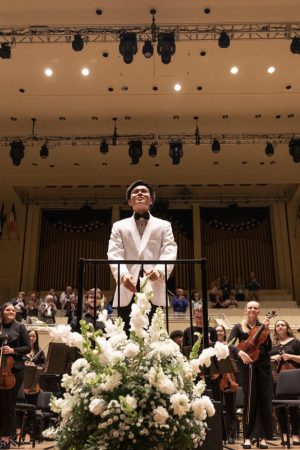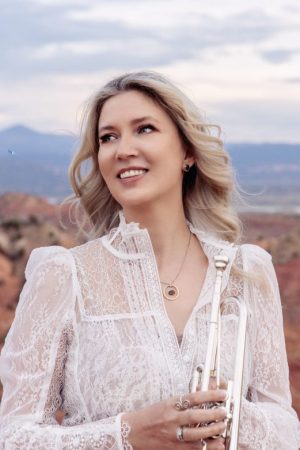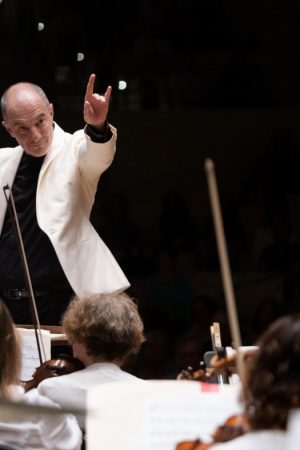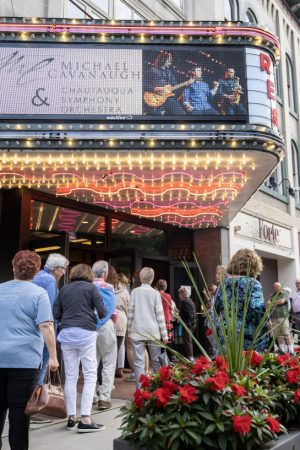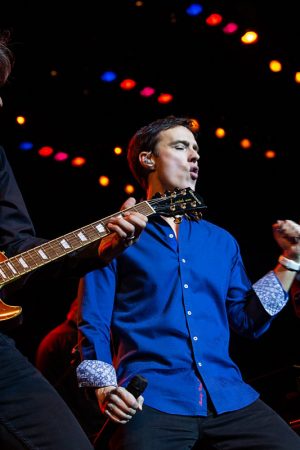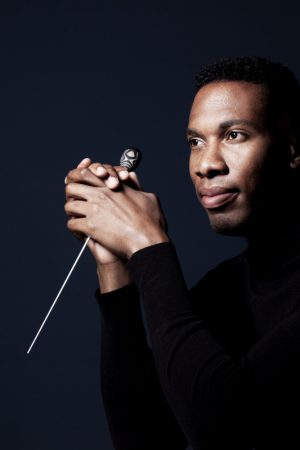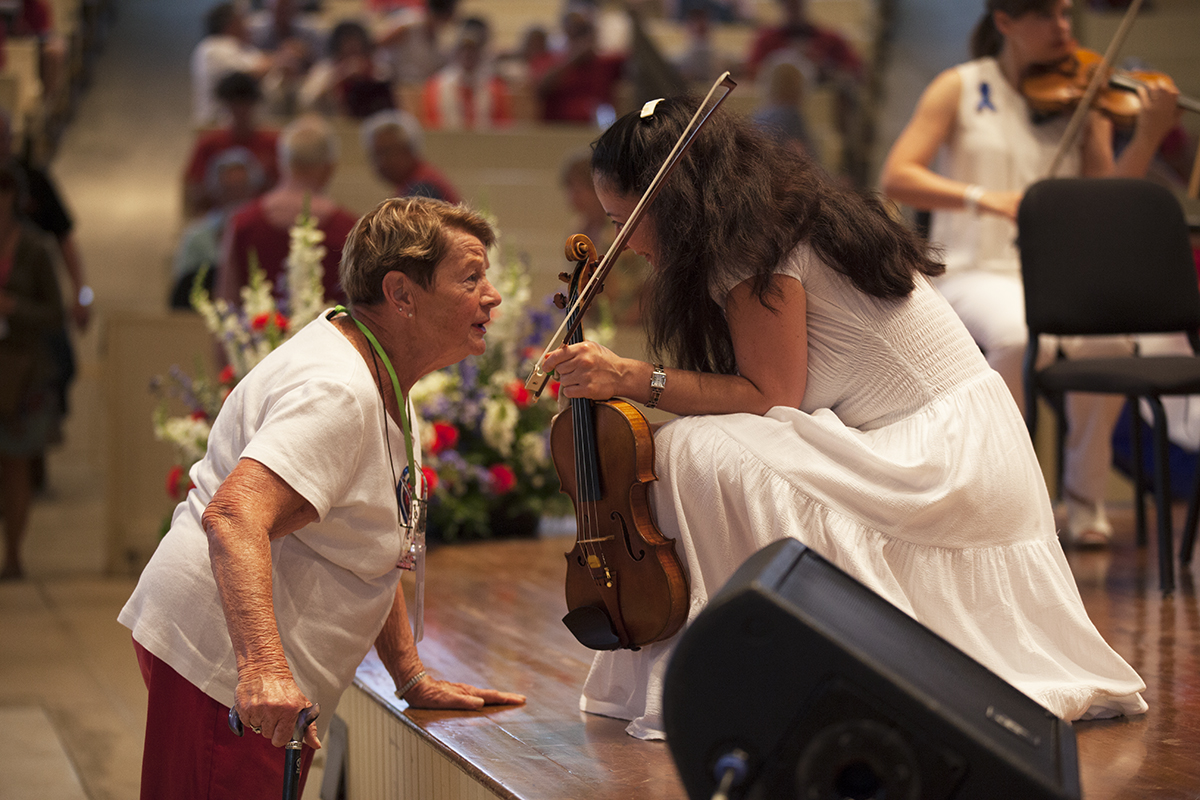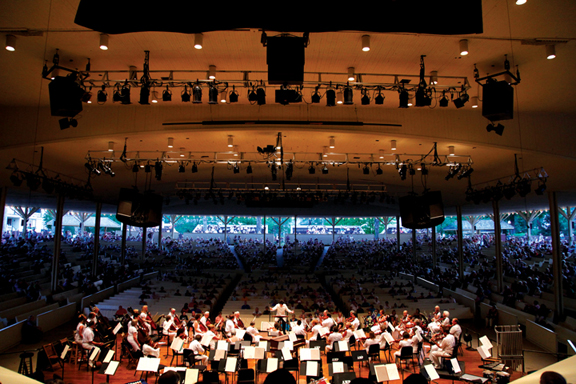
Guest conductor Mester, violinist Gomyo open CSO season
Lauren Hutchison | Staff Writer

When the members of the Chautauqua Symphony Orchestra reunite after their 10-month break, they will also welcome back guest conductor Jorge Mester and violinist Karen Gomyo. The CSO performs with Mester and Gomyo at 8:15 p.m. Saturday in the Amphitheater.
The last time Mester was in Chautauqua, in 1980, it was so hot that he went swimming in the lake past midnight, which was illegal.
“Maybe I’ll get arrested, although I think the statute of limitations will probably protect me if I meet a policeman there,” Mester said.
Mester has been conducting for decades and began studying the art when cellist Gregor Piatigorsky gave him a scholarship to attend the Tanglewood Music Center in Boston. There, he studied with Leonard Bernstein, who encouraged him to continue with his craft. Mester is the music director of the Louisville Orchestra and of the Naples Philharmonic Orchestra in Naples, Fla.

He’s looking forward to reconnecting with some of his colleagues from Naples and conducting the CSO again, which he remembers as a very rewarding experience.
“It’s amazingly easy because everybody knows the repertoire,” he said. “They’re there because they love the music and they love the summers there.”
Mester will also reunite with Gomyo, who last visited Chautauqua in 2006. Gomyo and Mester last performed together “when she was very tiny,” Mester said.
Gomyo remembers Mester as being extremely kind and open to letting her perform the way she wanted to.
“I remember him always being very inviting and very encouraging,” Gomyo said.
Gomyo got her start in music when she was 5 years old. At age 11, she began studying at The Juilliard School in New York with violin instructor Dorothy DeLay. Gomyo won the Young Concert Artists International Auditions at age 15. She plays the “Ex Foulis” Stradivarius violin, which was bought for her exclusive use by a private sponsor.
The last time she was in Chautauqua, Gomyo was still studying at school. Now, as an adult performer and a highly sought-after professional soloist, Gomyo looks at music in a more intellectual way.
“When I was younger, I used to create stories about the images that the music gave me,” she said. “Now I’ll look at a score, see the structure of it, and I’ll try to unlock the secrets about why certain things are written the way they are. Not to say that I perform according to that, but I think this knowledge does help the emotional relationship that you’re going to have with the music.”
Saturday’s program was created to complement Gomyo’s performance of Samuel Barber’s Violin Concerto, a piece that Gomyo has been performing since she was 13 years old. She characterized the piece as beautiful and lyrical with a famously fast and difficult last movement.
When Gomyo performed the piece for DeLay, the teacher related the piece to a romance in her youth. Gomyo said she wondered whether Barber wrote the piece with romance in mind, or if it evokes Barber’s travels in Switzerland, where he wrote the concerto.
“As with any piece, the wonderful thing about music is that it is timeless, but as the performer grows up and matures, I think the performer has a different perspective of the same music throughout his or her life,” she said.
To complement the concerto, Mester chose to open the program with Hungarian composer Ernst von Dohnányi’s “Symphonic Minutes.” The CSO has never played this piece before.
“I always like to bring a fresh piece to orchestras wherever I go,” Mester said. “It gives them an extra jolt of energy and vitality.”
The piece is written in five short vignettes, which Mester said were incredibly witty and surprisingly beautiful. He added he fell in love with the piece when he recorded “Ruralia Hungarica,” an all-Dohnányi album, with the West Australia Symphony Orchestra in Perth.
To close this evening’s performance, Mester selected Tchaikovsky’s Symphony No. 4, which he called a “warhorse.” Mester said the piece is challenging because it’s so well known.
“It’s very easy to lapse into automatic pilot,” Mester said. “The challenge for a performer is how to find what made the first performance of that piece such an amazing experience for the audience.”
After his Chautauqua concert, Mester hopes to find more opportunities to teach conducting.
“It is my way of passing down what my teacher gave me,” he said.
In addition to her busy soloist schedule, Gomyo has recently started performing more chamber music. She is also working on a collaborative project with Pablo Ziegler, a pianist who was in Astor Piazzolla’s quintet. Gomyo and Ziegler created a program in which Ziegler performs arrangements of Piazzolla’s famous tango music and Gomyo performs the Brahms, Bartók and Bach that inspired Piazzolla’s music.
After their performance in Chautauqua, Mester and Gomyo will meet again on Feb. 2, 2012, when Gomyo performs with the Louisville Symphony Orchestra.

